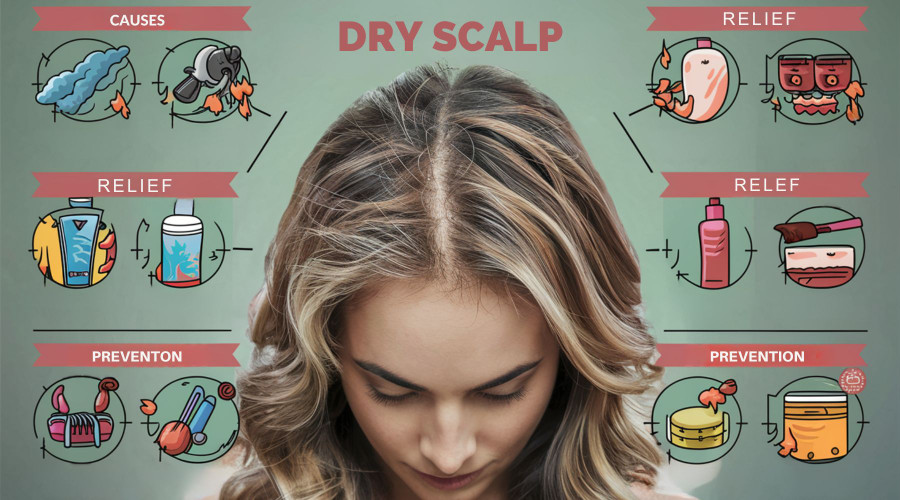Dry Scalp Causes, Relief, and Prevention
Mar 15, 2024 | By Eds

Ever found yourself scratching your head a bit too often, only to realize that your scalp and hair are dry? If your scalp is itchy and you notice those pesky white flakes on your shoulders, you might be dealing with a dry scalp. A dry scalp is a common issue that can be a real head-scratcher. It's a dermatological concern that affects people of all ages, causing discomfort and visible symptoms like flakes. While it might not be a severe medical condition, the persistent itching and irritation can be bothersome.
In this blog post, we'll unravel the prevalence of dry scalp, delve into its common associated symptoms, and discuss ways to manage and alleviate the discomfort. From understanding the causes to practical tips for maintaining a healthier scalp, this article aims to provide valuable insights into managing and preventing dry scalp issues.
Causes of Dry Scalp
Are you tired of that persistent itchiness on your scalp? Getting to the bottom of what's causing this discomfort is the initial step in seeking relief. Numerous factors influence the health of your scalp. Let's delve into them:
A Dehydrated Scalp
Failing to provide your scalp with adequate hydration, whether due to environmental factors or insufficient water intake, can lead to dryness and itchiness that can be pretty bothersome.
Imbalanced Washing
Striking the right balance in hair washing is crucial. Washing your hair too frequently can disturb the natural oils on your scalp, and not washing enough can result in the accumulation of dirt and oil, potentially causing dryness.
Harsh Hair Products
Strong shampoos, conditioners, or styling stuff with harsh chemicals can strip away the good oils, leaving your scalp irritated and dry.
Hot Water
While hot showers may feel fantastic, they can wash away your scalp's natural oils, leaving it dry and flaky.
Skin Troubles
Conditions like eczema or psoriasis can also make your scalp dry, itchy, and flaky. If you have these skin conditions, consult a dermatologist or a hair care expert to prescribe medications or products that suit your scalp.
Dietary Factors
Missing out on essential nutrients your skin loves can also lead to a dry scalp. Consume plenty of vegetables and fruits to ensure your body gets a good dose of vitamins and minerals.
Read more related articles:
- What Is Dandruff: Causes and Treatments
- Achieve Your Best Hair: Using A Scalp Scrub As Your Hair Care Game Changer
- What is a Sea Salt Scrub for the Scalp and How Does it Work?
Easy and Simple Relief for Dry Scalp
The persistent itch and those annoying flakes can lower your self-esteem. Dry scalp is a common issue that is mainly overlooked until it worsens. Here's a list of easy and effective ways to give your dry scalp the TLC it deserves.
- Handle with Care: Wash your hair with lukewarm water, avoid harsh shampoos and styling products, and substitute vigorous rubbing for a gentle pat when drying.
- Natural Moisture: Treat your scalp with natural moisturizers. Try applying coconut oil, olive oil, aloe vera gel, and other essential oils to nourish your hair.
- Humidify the Air: Consider using a humidifier, especially during dry winter, to add moisture to the air and give your scalp a break.
Tips on How to Prevent Dry Scalp
Dry scalp is easy to prevent; it involves adopting a proactive, mindful, and sometimes creative approach to your hair care and overall well-being. You can have dry-free hair and scalp by simply twitching your hair care regimen. Here are some practical tips to keep your scalp healthy and hydrated:
Get Serious with your H2O
Drink an adequate amount of water daily to ensure you stay well-hydrated. Proper hydration supports overall skin health, including the scalp.
Get Healthy
Keep a well-rounded diet that prioritizes vital nutrients such as vitamins and minerals. Incorporating fruits, vegetables, and foods rich in omega-3 fatty acids can contribute to enhancing the health of both your skin and hair.
No to Harsh Products
Select hair care items that match your hair type and scalp condition. Choose gentle shampoos and conditioners without sulfates and other toxic chemicals to prevent the removal of natural oils. Pick products formulated with natural ingredients.
Take a Break from Shampoo
Strike a balance in your washing routine. Avoid excessive shampooing to prevent the scalp from losing its natural oils. A break from shampoo is a must to prevent product build up and to restore the natural moisture on your locks.
Consider the Weather
Adjust your hair care regimen according to the weather. When the air is dry, consider a humidifier to add moisture in your tresses. During summer, use an all-natural hair mask or use hair accessories to shield your hair from harsh UV rays.
Stay Away from Stress
Practice stress-reducing techniques like meditation, yoga, or deep breathing exercises. High-stress levels can contribute to scalp issues. A healthy mind equals healthy wellbeing.
Sleep!
Ensure you get enough quality sleep. Sleep plays a crucial role in overall skin health, including the scalp. Having enough time to sleep can help the cells in your scalp to stay nourished for healthy hair growth and scalp.
Talk to an Expert
If you're experiencing persistent dryness or discomfort, consult a healthcare professional or dermatologist for personalized advice and potential treatment options.
Wrap-Up
Empower yourself by understanding the causes of dry scalp, a crucial step in managing and preventing it. Numerous factors, including environmental conditions, product choices, and underlying health issues, can contribute to dry scalp. By addressing the root cause, you can achieve lasting relief. Maintain a proper hair care routine, stay hydrated, and incorporate nourishing ingredients to significantly improve your scalp's health.
Share your scalp stories and inspire others to overcome dry scalp issues. Implement the tips and remedies discussed, and consult with a healthcare professional if needed. Your scalp's well-being contributes not only to physical comfort but also to overall confidence and self-esteem.




